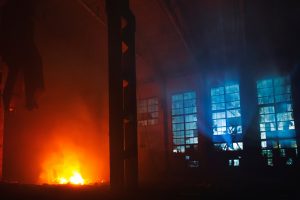The Occupational Safety and Health Administration (OSHA) cited an Ohio paint and resins manufacturer with two willful and 33 serious safety violations in connection with a fatal April 8 fire and explosion at Yenkin-Majestic Paint and OPC Polymers Corporation in Columbus. The agency proposed penalties totaling $709,960 and placed Yenkin-Majestic in its Severe Violator Enforcement Program (SVEP).
The agency cited Yenkin-Majestic for violations of the process safety management (PSM) and hazardous waste operations and emergency response (HAZWOPER) standards. OSHA also cited the employer for a lack of employee training and personal protective equipment (PPE).
The federal workplace safety investigation determined that the explosion and fire that killed a press operator lead and hospitalized eight other Yenkin-Majestic employees could have been prevented had the employer not altered a kettle reactor vessel improperly and then returned the vessel to service after it failed following the alterations.
In December 2020, Yenkin-Majestic Paint altered the kettle reactor vessel and the manway opening but did not ensure the vessel maintained its pressure-containing ability, according to the agency. On January 3, following the alteration, the newly installed manway failed. The company made additional alterations to the vessel when installing a new gasket and again failed to adhere to OSHA’s PSM standard, pressure vessel inspection procedures, and the American Petroleum Institute’s (API) pressure vessel inspection code.
OSHA’s investigation into the explosion determined the kettle reactor vessel released a flammable vapor cloud when its manway cover and gasket failed. The vapor flowed throughout the plant, ignited, and caused the initial explosion.
“Yenkin-Majestic Paint Corp. could have prevented this terrible tragedy if they had followed industry standards and removed a compromised kettle from service,” Acting Chicago Regional Administrator William Donovan said in an agency statement. “Knowing that this company altered equipment, failed to use a qualified fabricator and returned equipment to service aware that it did not meet safety standards is unacceptable,” Donovan continued.
Willful violations are cited when an employer either knowingly disregarded safety and health law and regulation or acted with indifference for employee safety and health and carry higher penalties. Employers included in the agency’s SVEP are subject to mandatory follow-up inspections and face increased agency pressure to abate cited safety and health hazards.
The U.S. Chemical Safety and Hazard Investigation Board (CSB) also dispatched a team of investigators to the Columbus facility following the April 8 incident. The CSB is an independent federal agency that investigates industrial chemical accidents.
Yenkin-Majestic personnel provided the CSB team with an overview of the company’s resin manufacturing process, according to the board. The alkyd resin manufacturing process utilizes the company’s own technology.
Materials are mixed in a metallic kettle, which contains an agitator and is heated by a furnace before it goes to a scale tank and then to product storage. There are a total of six kettles; the incident occurred during batch production in Kettle #3, which has a rated capacity of 20,900 pounds and is heated by a gas furnace.
CSB investigations can take several months and result in a report that can contain recommendations for government agencies, companies, trade associations, labor unions, and other groups.
Yenkin-Majestic Paint Corp., founded in Columbus in 1920, is a manufacturer of paint, resins, and coatings, according to OSHA.

